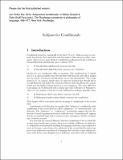| dc.contributor.author | von Fintel, Kai | |
| dc.date.accessioned | 2015-03-04T14:01:59Z | |
| dc.date.available | 2015-03-04T14:01:59Z | |
| dc.date.issued | 2012 | |
| dc.identifier.isbn | 978-0-415-99310-4 | |
| dc.identifier.isbn | 978-1-13-877618-0 | |
| dc.identifier.uri | http://hdl.handle.net/1721.1/95784 | |
| dc.description.abstract | Conditional sentences, canonically of the form "if p, q", whisk us away to a scenario described by their antecedent and then make a claim about it in the consequent. There are two main kinds of conditionals, as illustrated in the well-known Oswald/Kennedy minimal pair (due to Adams 1970): (1) If Oswald didn't kill Kennedy, somebody else did. (2) If Oswald hadn't killed Kennedy, someone else would have. Clearly, the two conditionals differ in meaning. The conditional in (1) signals that it is an open possibility that Oswald didn't kill Kennedy and will be judged true by anyone who knows that Kennedy was in fact assassinated. The conditional in (2), in contrast, signals that it is taken for granted that Oswald did in fact kill Kennedy and makes the somewhat dubious claim that Kennedy's assassination was inevitable, perhaps based on a vast conspiracy. The same difference in meaning can be illustrated with a similar pair (due to Bennett or Stalnaker?), where it is even harder to hear the second conditional as making a plausible claim: (3) If Shakespeare didn't write Hamlet, someone else did. (4) If Shakespeare hadn't written Hamlet, someone else would have. This chapter will be concerned with the meaning of conditionals of the second kind. | en_US |
| dc.language.iso | en_US | |
| dc.publisher | Routledge | en_US |
| dc.relation.isversionof | http://www.routledge.com/books/details/9780415993104/ | en_US |
| dc.rights | Creative Commons Attribution-Noncommercial-Share Alike | en_US |
| dc.rights.uri | http://creativecommons.org/licenses/by-nc-sa/4.0/ | en_US |
| dc.source | Von Fintel | en_US |
| dc.title | Subjunctive conditionals | en_US |
| dc.type | Article | en_US |
| dc.identifier.citation | von Fintel, Kai. 2012. Subjunctive conditionals. In Gillian Russell and Delia Graff Fara (Eds.), The Routledge companion to philosophy of language, 466-477. New York: Routledge. | en_US |
| dc.contributor.department | Massachusetts Institute of Technology. School of Humanities, Arts, and Social Sciences | en_US |
| dc.contributor.approver | von Fintel, Kai | en_US |
| dc.contributor.mitauthor | von Fintel, Kai | en_US |
| dc.relation.journal | The Routledge companion to philosophy of language | en_US |
| dc.eprint.version | Author's final manuscript | en_US |
| dc.type.uri | http://purl.org/eprint/type/BookItem | en_US |
| eprint.status | http://purl.org/eprint/status/NonPeerReviewed | en_US |
| dspace.orderedauthors | von Fintel, Kai | en_US |
| dc.identifier.orcid | https://orcid.org/0000-0002-7912-4246 | |
| mit.license | OPEN_ACCESS_POLICY | en_US |
| mit.metadata.status | Complete | |
